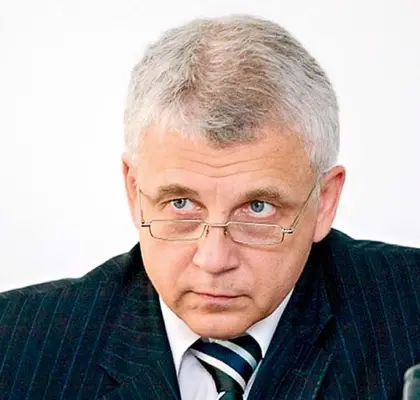With attention focused on the trial of former Prime Minister Yulia Tymoshenko, relatives of another imprisoned former government minister are struggling with what they denounce as his politically motivated imprisonment and his fragile health.
Largely out of the spotlight, Valeriy Ivashchenko, a former acting defense minister from June 2009 until March 2010, was arrested on Aug. 21, 2010 on charges of abuse of office.
JOIN US ON TELEGRAM
Follow our coverage of the war on the @Kyivpost_official.
He remains in jail as his trial continues, one of a dozen former high-level government officials who are under investigation in what Western capitals have called selective prosecutions.
His daughter, Valeria, issued a public plea for his release on Aug. 14 as his father’s imprisonment entered the one-year mark.
But Valeria, 26, and her brother Serhiy, 29, spend most of their time out of public view, poring over court decisions, medical reports and case documents.
“Most mass media are interested in Tymoshenko because she is the opposition leader. Maybe now we will get less attention to our case. But we always try to stress that this case shouldn’t exist, to make people hear us,” Valeria said.
Prosecutors accuse Ivashchenko of exceeding his authority on Nov. 18, 2009 by signing an allegedly unlawful draft plan for the reorganization of the bankrupt Feodosia Ship Repair Plant in the Crimea, a charge he denies.
Most mass media are interested in Tymoshenko because she is the opposition leader. Maybe now we will get less attention to our case. But we always try to stress that this case shouldn’t exist, to make people hear us. – Valeria Ivashchenko, Ukraine’s former defense minister’s daughter
President Viktor Yanukovych has repeatedly denied any interference in the cases against Tymoshenko, whom he defeated to win the presidency in 2010, and her allies.
The family thinks that people Ivashchenko fired while he was defense minister are now seeking retribution with the change in power.
“There are no reasons for keeping him in prison. It was a political decision,” Serhiy said. “We think that this is about revenge.”
The General Prosecutor’s Office did not respond to questions faxed on Aug. 19 as Kyiv Post went to print on Sept. 1.
Ivashchenko has been kept in detention since his arrest. In court he is held in a cage; he can see one family member once per month. His family claims his poor health is being exacerbated by a lack of appropriate medical care.
Valeria and Serhiy are convinced of their father’s innocence.
They are also sure that the authorities are pursuing him and treating him harshly for political reasons.
On Aug. 1, Pechersk District Court in Kyiv denied motions seeking more lenient measures that would have allowed Ivashchenko to attend his trial without being encaged and to be released from detention on bail.
Current detention rules restrict family visits to one every month. Valeria saw him on a recent Friday. “But if I will visit him once in a month, he will not be allowed to see my mother or my brother in that same month,” Valeria said.
Visits last for one hour and Ivashchenko’s children and wife may only communicate with him through a glass partition and speak via telephone.
In 2000 and again in 2002, the European Commission for the Prevention of Torture and Inhuman or Degrading Treatment or Punishment criticized this Ukrainian practice.
A recent report from the Danish Helsinki Committee for Human Rights criticized numerous aspects of Ivashchenko’s trial, including his caging, the postponement of medical treatment, and the violation of his right to family life through what it called “the excessive and disproportionate” restrictions on Ivashchenko’s contact with family members.
Ivashchenko’s children are particularly concerned by their father’s deteriorating health.
While media attention over recent days has focused on the health of Tymoshenko, Ivashchenko has been complaining of serious medical problems for months.
Most recently, his son said, Ivashchenko began to lose feeling in his toes due to a back injury sustained in youth that requires regular medical treatment.
“In prison it is impossible to get medical help because there is no neurologist or neurology department,” Valeria said, rifling through months of medical testimony piled high on a desk.
She said examinations of her father at the Kyiv Hospital of Emergency Aid and the Kyiv Center of Endocrinology have confirmed his need for neurological treatment, but the detention center says it cannot provide such medical assistance.
A spokeswoman for European Union foreign policy chief Catherine Ashton said Ivashchenko’s health is “a matter of concern to us.”
Ivashchenko has also claimed that his ailments are aggravated by confinement to a cage during trial.
The official explanation for the continued detention of Ivashchenko is that he could put pressure on or influence witnesses through his corrupt connections. – Serhiy Ivashchenko, Ukraine’s former defense minister’s son
His children said they believe that prosecutors are deliberately denying him medical treatment for existing conditions.
“They will try to destroy him physically,” Serhiy said.
The official explanation for the continued detention of Ivashchenko is that “he could put pressure on or influence witnesses through his corrupt connections,” said Serhiy, citing court documents.
He added that family members are considered witnesses and “corrupt connections,” even though “we know nothing about what happened.”
Ivashchenko’s trial continues on Sept. 20.
Meanwhile, the children struggle on without their father, reading documents and meeting with lawyers to fight his corner.
“We feel the absence of our father every day,” Valeria said.
“There were no reasons for thinking it could happen,” Serhiy added. “But as we found out, it can happen in our country. Especially under the current authorities.”
Kyiv Post staff writer Will Fitzgibbon can be reached at [email protected]
You can also highlight the text and press Ctrl + Enter




